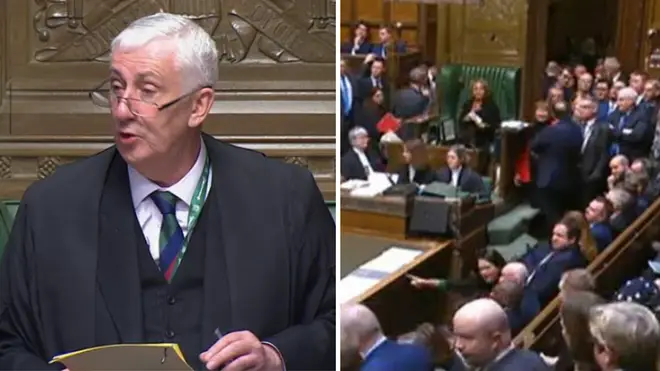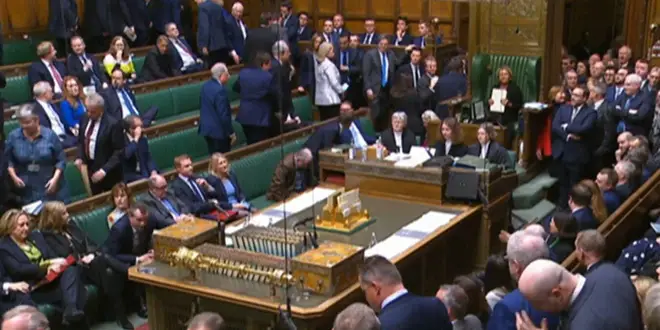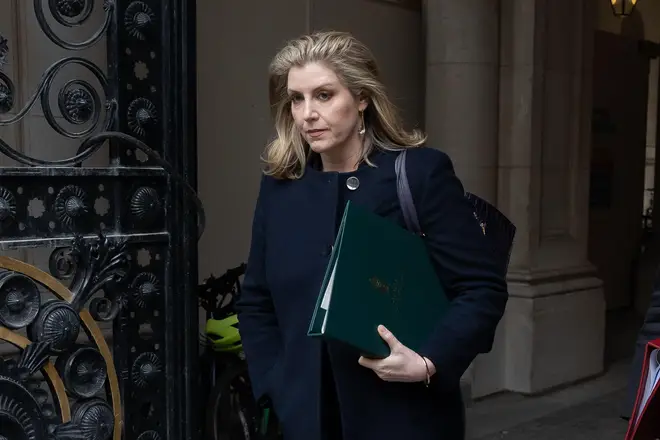
Rachel Johnson 6pm - 9pm
22 February 2024, 10:49 | Updated: 22 February 2024, 12:08

Sir Lindsay Hoyle is not planning to quit as Speaker of the House of Commons despite dozens of MPs saying they have no confidence in him after the chaos of Wednesday's Gaza ceasefire vote.
Sir Lindsay was seen in the tea room of the House of Commons for breakfast on Thursday morning, where Labour MPs are said to have broken into a round of applause.
The Speaker, who was previously a Labour MP, is fighting for his political future after breaking with convention to allow a vote on a Labour amendment to an SNP motion calling for a ceasefire between Israel and Hamas in Gaza.
Wednesday was a day that had been designated as an opposition day, and in this case the SNP were given the chance to choose what MPs vote on. Usually on opposition days only the government can amend motions. But Sir Lindsay allowed Labour to have their own amendment debated, as well as the government.
That prompted a mass walkout from furious Tory and SNP MPs, with several accusing him of allowing Labour to "hijack" the vote on a ceasefire.

Watch Again: Nick Ferrari speaks to Women's Health Strategy Maria Caulfield
Some 58 MPs have backed a motion of no confidence calling for him to quit as of midday on Thursday. But he retains the backing of others in Labour and even has support among some Conservatives.
There is no formal mechanism to remove a Speaker from office. In 2009, Speaker Michael Martin stepped down for his role in the parliamentary expenses scandal after 22 MPs backed a no-confidence motion - fewer than half the number who want Sir Lindsay to step down.
The speaker is due to meet with Penny Mordaunt, the leader of the House of Commons, and chiefs whips later today, according to minister Maria Caulfield.

Natasha Clark joins Andrew Marr to discuss the fallout from the House of Commons today
Ms Caulfield, the minister for women's health strategy, said that the scenes on Wednesday evening were "a shambles".
She told LBC's Nick Ferrari: "We just felt as you saw the scenes unfold we just couldn't take part in it.
"It wasn't fair on the SNP and I'm not the SNP’s biggest supporter but to be fair to them they had a right to have a vote on their debate.
"I had hundreds of emails from my own constituents wanting me to vote one way or the other, and it was clear that this was not going to be a fair vote and we felt we just could not take part in it, and we wanted to walk away from the shambles that were ensuing.
"There's hostages still captured, there's a humanitarian crisis in Gaza, they are the issues that we should have been debating last night."
She added that it was "completely out of character" for Sir Lindsay and added: "He was absent from the chamber for most of the morning.
"It was clear there were some negotiations going on, some heated debates in the corridors around the chamber.
"And whether pressure was put on him by Labour, who were going to lose their vote, I don't know. But he went against the advice of the clerks of the House, that is a bit of a red line, but let's see what he says when he meets the leader of the House and the chief whips today."

The motion against him reads: "That this House has no confidence in Mr Speaker."
This motion has previously seen speakers leave the role, with one famous example including former speaker Michael Martin who resigned in 2009 in anticipation of losing the vote.

SNP'S Ian Blackford admits that what transpired in the Commons today was 'shameful'
Stephen Flynn, leader of the SNP in the Commons, said he feared the Speaker's position is untenable, though he refused to call for him to resign.
Richard Thomson, SNP MP for Gordon, told Nick that the Speaker's authority was "significantly diminished".
He said: "What we should be talking about is the 30,000 dead, the plight of the hostages, the collective punishment."
He added that the discussion should not be about a "procedural wrangle" and Sir Lindsay's future.

The vote was meant to held on the SNP's call for an immediate ceasefire that would "stop the slaughter of innocent civilians" in Gaza. It also made reference to the "collective punishment" of Palestinians, which could effectively accuse Israel of a war crime.
The SNP was allowed to hold the vote because Wednesday was an "opposition day", where Labour or the SNP can decide what is debated.
Labour had concerns about the wording and amid fears that forcing its MPs to abstain on the SNP motion - knowing several of its politicians wanted to vote for it - could lead to resignations, the party tabled an amendment calling for an "immediate humanitarian ceasefire".
The Conservatives tabled their own amendment calling for a pause, instead of a ceasefire. Usual procedure for opposition days says only government amendments should be selected by the speaker.
But Sir Lindsay made the unusual move of allowing another opposition party's amendment to be put to a vote.
The Labour Party amendment was passed by the House - though it followed a mass walk out in process at Sir Lindsay.
Apologising to MPs and seemingly on the verge of tears, told MPs that Wednesday's debate was "exceptional in its intensity with which all parties wished to secure a vote on their own propositions".
He said he accepted all three amendments in an attempt to reflect "the widest range of propositions on which to express a view" and also because he had become "very, very concerned about the security of all members".
But Sir Lindsay went on to admit that what he intended had not happened and said he recognised the "strength of feelings of members on this issue".

'The idea that somehow he could be bullied into taking a decision is completely wrong.'
Reports emerged overnight that Sir Lindsay had been pressured into allowing a vote on Labour's amendment by the party's leadership. Labour has denied this.
Asked whether she believed Sue Gray, the former civil servant and "Partygate" inquisitor, could have been involved, Ms Caulfield said: "She was definitely in conversation with heated conversations with Labour MPs who are wanted to vote for the SNP's motion.
"It's very, very surprising to see someone who's not an MP such as Sue Gray influencing MPs just ahead of a vote like that.
"You could hear quite raised voices, you could hear huddles going on, very unusual to see scenes like that. There was clearly an issue that the Labour party had with that vote and the rumours are that Sir Keir Starmer went to see the speaker to have a discussion with him."
Geoff Hoon, a former Labour chief whip, leader of the House, and defence secretary told Nick: "The idea that somehow the Speaker of the House of Commons could be bullied into taking a decision is completely wrong."
He added that "any attempt at bullying would be counter-productive."
In his previous roles Mr Hoon had regular meetings with the Speaker to decide Commons business, "and there was always someone else present," he said.